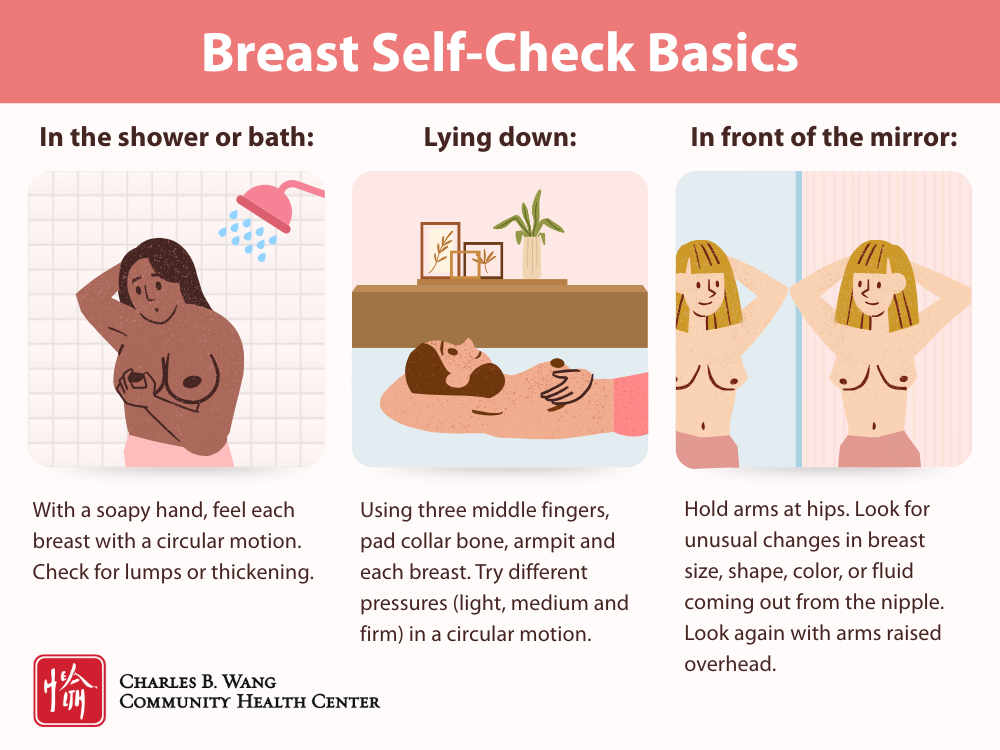Closing Gap in Women's Breast Cancer Care
Reviewed by: Jessica Marchessault, MPH
.png)
October is nationally recognized as Breast Cancer Awareness Month, a time dedicated to promoting education, early detection, and improved outcomes for individuals affected by breast cancer. In this article, we highlight the importance of regular screenings, early detection, and the benefits of women's cancer care for all.
Understanding Breast Cancer
A 2024 report shows that breast cancer is “the most common cancer diagnosed among women in the United States” as well as “the 2nd leading cause of death from cancer among women” after lung cancer.1 Although breast cancer remains one of the most diagnosed cancers among women, timely screening and appropriate treatment can improve survival rates and quality of life for those who have been diagnosed.2
Breast cancer occurs when cells in the breast grow uncontrollably, forming a tumor that can invade surrounding tissues or spread to other parts of the body. Though it can affect people of all genders, breast cancer is far more common in women.
Beyond sex assigned at birth, several factors may contribute to a person’s risk, including age, family history, genetics, and reproductive history.3 Understanding your risk of breast cancer is an important tool for making informed decisions about your health. However, anyone can develop breast cancer, even those without known risk factors.
Early detection remains the most effective tool in reducing the impact of breast cancer. When found and treated in its early stages, survival rates are significantly higher, and treatment options tend to be less invasive.
Women of Color Face Higher Mortality Rates
Statistics show that women of color who are diagnosed with breast cancer are more likely to die from the disease than their white peers, despite advances in breast cancer detection and treatment. Black women have the highest breast cancer mortality rate, even though rates of new breast cancer diagnoses are lower for Black women than white women.4 Other studies have found a 52% increase in new breast cancer cases among AAPI women under age 50 and an increasing breast cancer death rate among AAPI women of all ages.5
These disparities arise from a combination of social, economic, biological, and systemic factors. While lifestyle and stress play a role, women of color are also more likely to face barriers to healthcare access, including lack of insurance, underinsurance, and limited access to quality care. These barriers can lead to delays in diagnosis and treatment, which are critical in improving survival rates.6 Furthermore, structural racism and discrimination within healthcare systems can result in unequal treatment and care, further exacerbating health disparities.
Acknowledging these disparities may encourage women of color to talk to their provider about their breast cancer risks and talk to their friends and family about the importance of breast cancer screenings. It is also a reason why we recognize breast cancer awareness month and continue advocating for better healthcare for all.
What You Can Do This Breast Cancer Awareness Month
Breast Cancer Awareness Month is not only a time for reflection. It is also a chance to take meaningful action. Whether you have been personally affected by breast cancer or simply want to support your community, there are practical steps you can take to make a difference.
Prioritize Regular Checkups and Screenings
One of the most effective ways to stay on top of your breast health is through routine medical care. An annual gynecological checkup is a good opportunity to discuss breast health with your provider, review your personal and family history, and determine whether additional screening, such as a mammogram, is recommended for you.
If you are over 40, have a family history of breast cancer, or have other risk factors, talk to your healthcare provider about when and how often you should be screened. Remember, early detection can significantly improve outcomes.
Already on track for your annual checkups? Consider helping someone else take that step, too. Encourage a friend or family member to make an appointment, especially if they have delayed care. Many local health organizations offer a low-cost health program for those who are uninsured or underinsured.
Start Monthly Self-Check
Although a self-check should not replace regular screenings with your provider, being familiar with what is normal for your body is an important part of early detection. A breast self-check may be easier than you think. Follow the steps below each month to look for unusual breast changes, and see your health care provider if you notice any abnormalities.

Share Reliable Information
One of the simplest but most powerful things you can do during Breast Cancer Awareness Month is to share accurate, evidence-based information. In an age where misinformation spreads quickly, especially online, making sure your friends, family, and community have access to trustworthy resources can make a real difference.
If you are not sure where to start, head over to our center’s Online Health Library to access free clinically reviewed health education materials in multiple languages.
Addressing Gaps Through Access and Education
When facing breast cancer, you are not alone. The Charles B. Wang Community Health Center’s OBGYN department is committed to empowering women to stay proactive about their health, regardless of background, income, or insurance status. Whether it is preventive care, treatment of common gynecological conditions, or referral to a mammogram and other specialty care, our care team is here to support patients and families through high-quality and affordable health care. We are proud to offer culturally responsive care with the support of bilingual clinicians, social workers, and health educators, who understand both your medical and cultural needs.
FAQs:
1. How can I reduce my risk of breast cancer?
While you cannot always prevent breast cancer, there are steps you can take to lower your risk: get regular checkups and screenings, stay active and eat healthy, avoid tobacco and alcohol, and know your family history.
2. What makes culturally responsive care important in cancer prevention?
Culturally responsive care builds trust, improves communication, and ensures that every person receives care that respects their background, language, and values. It helps remove barriers to screening and leads to better health outcomes. It is the Charles B. Wang Community Health Center’s commitment to provide inclusive and patient-centered care for all.
3. Does CBWCHC offer breast cancer screenings?
Yes, our goal is to make breast cancer screening accessible and affordable. We offer clinical breast exam (CMB) performed by a trained healthcare provider during routine checkups. When applicable, we help with breast ultrasound and mammogram referrals, connecting you to follow-up care and support services.
Sources
- https://www.cancer.org/research/cancer-facts-statistics/breast-cancer-facts-figures.html
- https://www.cdc.gov/breast-cancer/statistics/
- https://bcrisktool.cancer.gov/about.html#OtherRiskAssessmentTools]
- https://www.cancer.org/content/dam/cancer-org/research/cancer-facts-and-statistics/breast-cancer-facts-and-figures/2024/breast-cancer-facts-and-figures-2024.pdf
- https://www.roswellpark.org/cancertalk/202502/why-are-breast-cancer-rates-rising-among-asian-american-pacific-islander-women
- https://www.health.com/black-women-higher-breast-cancer-mortality-rates-8720369
Heading
Lorem ipsum dolor sit amet, consectetur adipiscing elit. Suspendisse varius enim in eros elementum tristique. Duis cursus, mi quis viverra ornare, eros dolor interdum nulla, ut commodo diam libero vitae erat.


Heading
Lorem ipsum dolor sit amet, consectetur adipiscing elit. Suspendisse varius enim in eros elementum tristique. Duis cursus, mi quis viverra ornare, eros dolor interdum nulla, ut commodo diam libero vitae erat.
The Charles B. Wang Community Health Center is a nonprofit and federally qualified health center offering comprehensive primary care services to all in six convenient locations in Manhattan and Queens seven days a week.








